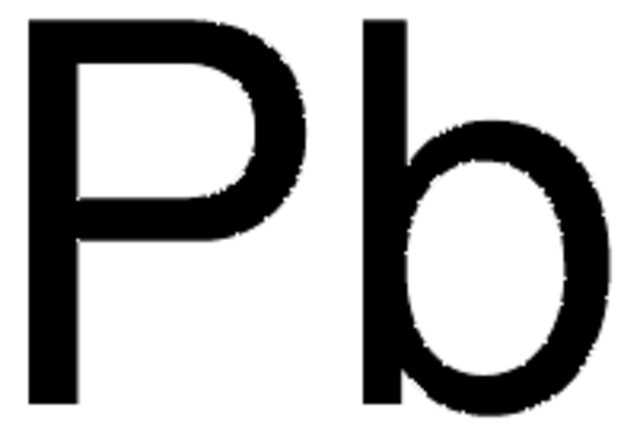GF83758720
Lead
foil, 6mm disks, thickness 0.125mm, as rolled, 99.95%
Synonym(s):
Lead, PB000311
About This Item
assay
99.95%
form
foil
manufacturer/tradename
Goodfellow 837-587-20
resistivity
20.65 μΩ-cm
diam. × thickness
6 mm × 0.125 mm
bp
1740 °C (lit.)
mp
327.4 °C (lit.)
SMILES string
[Pb]
InChI
1S/Pb
InChI key
WABPQHHGFIMREM-UHFFFAOYSA-N
1 of 4
This Item | GF00423829 | GF11571229 | GF14497320 |
|---|---|---|---|
| manufacturer/tradename Goodfellow 837-587-20 | manufacturer/tradename Goodfellow 004-238-29 | manufacturer/tradename Goodfellow 115-712-29 | manufacturer/tradename Goodfellow 144-973-20 |
| assay 99.95% | assay ≥99.95% | assay 99.95% | assay 99.95% |
| mp 327.4 °C (lit.) | mp 327.4 °C (lit.) | mp 327.4 °C (lit.) | mp 327.4 °C (lit.) |
| resistivity 20.65 μΩ-cm | resistivity 20.65 μΩ-cm | resistivity 20.65 μΩ-cm | resistivity 20.65 μΩ-cm |
| bp 1740 °C (lit.) | bp 1740 °C (lit.) | bp 1740 °C (lit.) | bp 1740 °C (lit.) |
General description
Legal Information
signalword
Danger
hcodes
Hazard Classifications
Aquatic Acute 1 - Aquatic Chronic 1 - Lact. - Repr. 1A - STOT RE 1 Oral
target_organs
Central nervous system,Blood,Immune system,Kidney
Storage Class
6.1C - Combustible acute toxic Cat.3 / toxic compounds or compounds which causing chronic effects
wgk_germany
nwg
flash_point_f
Not applicable
flash_point_c
Not applicable
Choose from one of the most recent versions:
Certificates of Analysis (COA)
Sorry, we don't have COAs for this product available online at this time.
If you need assistance, please contact Customer Support.
Already Own This Product?
Find documentation for the products that you have recently purchased in the Document Library.
Our team of scientists has experience in all areas of research including Life Science, Material Science, Chemical Synthesis, Chromatography, Analytical and many others.
Contact Technical Service

